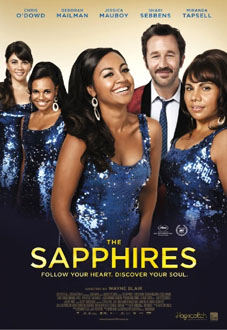
Australia 2012
Starts June 7, 2013
Directed by: Wayne Blair
Writing credits: Tony Briggs, Keith Thompson
Cast: Chris O'Dowd, Deborah Mailman, Jessica Mauboy, Miranda Tapsell, Shari Sebbens
Length: 103 minutes
 With a richly developed script combining historical realities, great soul music and characters who capture our hearts, The Sapphires is wonderfully entertaining, and informative. Growing up singing gospel with their mom, and for their remote mission community, these girls know in their hearts they are good. So when a local talent contest is announced, they decide this is also their year. It is 1968: indigenous Australians have been given the right to vote, and hippies, drugs, assassinations, and Vietnam have impacted global thinking. Meeting Dave cum talent scout offsets their consternation at the local contest’s outcome. Dave (O'Dowd) may not be rhythmically astute, and he may like his drink and have a skeleton in the closet, but his heart is huge, and, he recognizes their talent. Julie initiates a job offer, but Gail’s challenging attitude forces his hand; one call to an old friend and Dave lands them an audition in Melbourne.
With a richly developed script combining historical realities, great soul music and characters who capture our hearts, The Sapphires is wonderfully entertaining, and informative. Growing up singing gospel with their mom, and for their remote mission community, these girls know in their hearts they are good. So when a local talent contest is announced, they decide this is also their year. It is 1968: indigenous Australians have been given the right to vote, and hippies, drugs, assassinations, and Vietnam have impacted global thinking. Meeting Dave cum talent scout offsets their consternation at the local contest’s outcome. Dave (O'Dowd) may not be rhythmically astute, and he may like his drink and have a skeleton in the closet, but his heart is huge, and, he recognizes their talent. Julie initiates a job offer, but Gail’s challenging attitude forces his hand; one call to an old friend and Dave lands them an audition in Melbourne.
Counterbalancing concerns from the tight-knit family, Dave’s next gigantic hurdle is to shake-up the lineup. Gail (Mailman) as the oldest has been singing lead, with backing from Cynthia (Tapsell), Julie (Mauboy), and Kay (Sebbens). Once Dave accomplishes that, he tackles their country and western repertoire. As a “soul” man, Dave immerses them in visual and audio stimuli—“sing blacker”; their audition to entertain US troops concludes with, “See you in Saigon”. Kay spontaneously thinks up their name, and the aborigine Songbirds metamorphose into the Sapphires, Australia’s answer to the “Supremes”. They embrace Vietnam’s grueling, twenty-seven shows in twenty-three days schedule with youthful energy. This journey generates individual inner-growth, coming to terms with personal and familial issues and fears, friendship, and love.
Based on a true story, Tony Briggs—son of a real-life Sapphire, shares writing credits with Keith Thompson, and director Wayne Blair has aboriginal roots. Melinda Doring’s sets capture the 1960s era, with notable camera work from Warwick Thornton, and editing from Dany Cooper. Musically invigorating, the film quietly reminds us there are important past societal issues that should be remembered. Fun and humor are mixed into this celebration to personal motivation, perseverance, and life. ()
